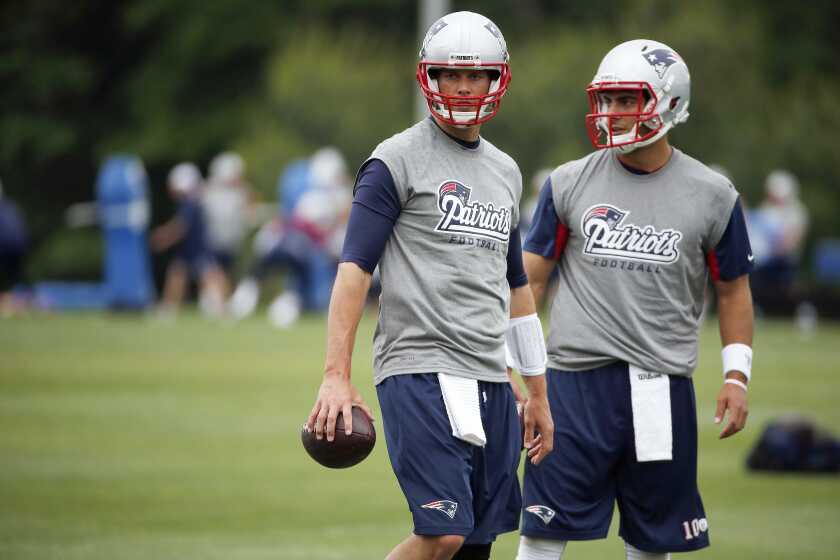Mark McGwire earns his chance for a new path with Dodgers
When you think of Mark McGwire, you think of numbers, but not those numbers.
You don’t think of 583 career homers, or 70 homers in 1998, or one homer in every 10.61 at-bats.
You think, instead, of 19.5.
That is the percentage of baseball Hall of Fame votes he received last winter. He received 19.5% when 75% is required for entry. His name will appear for nine more years on the regular ballot, but it could be there 90 years, he still has zero chance of ever entering Cooperstown, a notion that is important now that he’s entering Chavez Ravine.
The man whose career highlights were carved from steroid use is now being eternally punished for it. The thick goateed mug that was once the face of baseball’s steroid era has become the thinner, remorseful visage of baseball’s steroid retribution.
Mark McGwire has paid a huge price for his crime against sport. He will continue to pay a price for the rest of his life, his monstrous achievements stained, his sterling reputation sullied.
At some point, he deserves a chance to carve a new future without being continually defined by his past. In leaving his cocoon as the St. Louis Cardinals hitting coach to do the same job for the Dodgers, he seems to have arrived at that time.
Mark McGwire can coach the heck out of hitting. The Dodgers need someone who can coach the heck out of hitting. It was a good move for both parties. End of story.
“I was born to be a baseball player, that’s it,” McGwire said on his introductory conference call Wednesday. “Now, in the twilight in my life, I was born to be a coach, so here I am.”
Here he was, indeed, greeting the media with a giant first swing that left the yard. He was accountable. He was open. He talked about steroids with pain, and hitting with joy, and by the end of the call, you were ready to grab a bat and join him.
I asked the steroid question, so you can blame me.
“It something I did, it’s something I have to live with the rest of my life,” he said. “I understand everything about what the Hall of Fame is all about, I totally respect that. It was a mistake that I’ve made, I’ve owned up to it, I’ve moved on, I don’t know what else to say.”
It is hard to forget how a cartoonishly big McGwire thrilled the nation by breaking Roger Maris’ venerable home run record in 1998, then embarrassingly struck out seven years later when he danced around steroids questions at a congressional hearing.
He didn’t lie, he just didn’t tell the truth, and then he basically went into hiding until he decided he wanted to be the Cardinals’ hitting coach in 2010. At that point, knowing that he couldn’t work in baseball under this unsettling cloud, he finally confessed, acknowledging that he had intermittently used steroids for a decade.
If there was no job at stake, would he have fessed up on his own? At this point, knowing how many cheaters from that era are still hiding, does it really matter?
“When I came back in 2010, I confronted it head-on,” McGwire said. “I had to go through what I had to go through.”
The Cards brought him back to their dugout, but the baseball writers essentially banned him from Cooperstown. Under current Tribune Co. policy, I am not allowed to use my Hall of Fame vote, but if that privilege is returned, I would not vote for him, as I believe his best years were built on performance-enhancing drugs.
But since he took over the Cardinals, his hitters’ numbers are legit. In some ways, they are even more impressive than his own. During his three seasons there, Cardinals hitters led the league in batting average and on-base percentage while ranking second in runs.
I can understand a huge McGwire hitting the 10th-most homers in major league history, but how does David Freese hit his way to World Series most valuable player? How does Allen Craig bat .400 with runners in scoring position this year? And since when did Yadier Molina become a legitimate MVP candidate?
McGwire managed all that success, then, wanting to be near his Irvine home, managed to persuade the Cardinals to allow him to become one of the hottest coaching free agents in years. The Dodgers, with a lineup of great hitters who sometimes seem to have little clue, were a perfect fit.
“When we played St. Louis the past few years, there were always conversations about how well they adjusted inside a game, inside an at-bat,” said Dodgers General Manager Ned Colletti. “We’re privileged and thrilled to have a person of this quality.”
I also asked Colletti about the steroids, so you blame me for that too.
“That he apologized for it, that’s very important, we all make mistakes,” said Colletti. “He’s done other things in his life of high character. When you talk to people who really know him, when you see how he lives his life … you forgive the mistake.”
That McGwire has been willing to resurrect all the questions and relive all the embarrassment for a chance to spend five hours a day standing behind a batting cage shows his crazy love for his craft.
“I got back into the game because I love teaching; I didn’t do it for any attention, and sometimes I’m sorry the attention does follow me,” he said.
There’s no forgetting here, certainly, but this narrative seems to have moved long past forgiveness and into, you know, pitch counts.
“Hitting is patience, patience, patience,” McGwire said. “Get the starter to 80 pitches in five innings, work the count, that’s what the game is all about.”
At the depth of McGwire’s steroid humiliation, St. Louis politicians even removed his name from a local highway. Having climbing out of that ditch, he deserves every chance to carve a new path here.
twitter.com/billplaschke
More to Read
Go beyond the scoreboard
Get the latest on L.A.'s teams in the daily Sports Report newsletter.
You may occasionally receive promotional content from the Los Angeles Times.











